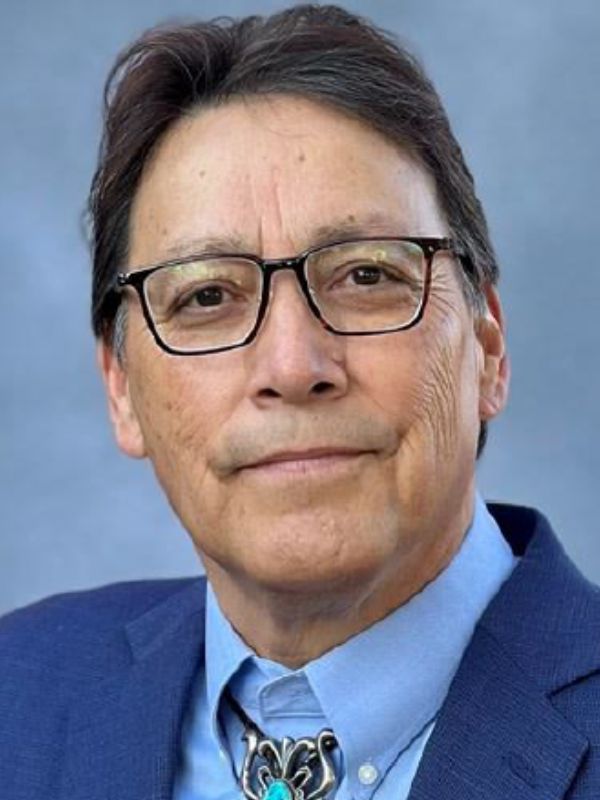Dr. Charles Roessel, President of Diné College, has been named the 2023-2024 Tribal College President Honoree of the Year by the American Indian College Fund, which recognizes individuals who have made significant contributions to the tribal college movement.

According to a statement of the Fund, growing up on the Navajo Reservation, Roessel was deeply influenced by his parents, who played pivotal roles in establishing Navajo Community College (Diné College), in 1968. Despite his father serving as the institution's inaugural president, Roessel initially did not envision following in his footsteps.
After graduating from Chinle High School, Roessel pursued a bachelor's degree in photo communications from the University of Northern Colorado. This kickstarted his passion for photojournalism, which he later pursued at Prescott College, earning a master's degree.
Roessel's journey into education leadership began as the Superintendent of Rough Rock Community School, where he concurrently pursued a doctorate in educational administration and supervision from Arizona State University.
His tenure as co-chair of the No Child Left Behind School Facilities and Construction Negotiated Rule-making Committee provided first-hand insights into the challenges facing tribal schools, motivating his subsequent roles as the director of the 66 Navajo schools for the Bureau of Indian Education (BIE) and later as the BIE director.
Roessel's expanded Diné College to a four-year college with a focus on innovation and creativity, exemplified by initiatives like the School of Transformation, which offers professional development and training programs.
Recognizing the importance of economic development, Roessel pursued alternative revenue streams and was instrumental in Diné College's recognition by the Aspen Institute for its economic impact.
Amid the challenges of the COVID-19 pandemic, Roessel prioritized addressing students' needs for internet access and technology, advocating for equitable opportunities in education.
Looking forward, he envisions Diné College enrolling 3,000 students by 2030 and offering three master's programs while remaining culturally relevant to the Navajo Nation and the region.
Beyond his professional endeavors, Roessel remains grounded in his family and personal passions, including golfing and teaching photography courses. His dedication to preserving Navajo language and culture underscores his commitment to serving his community.
In recognition of his outstanding contributions, Roessel was awarded a $1,200 honorarium sponsored by the Adolph Coors Foundation.
“All of the educators, students, and their families who work within our communities to make education accessible and meaningful are deeply grateful for the vision and hard work of Dr. Roessel,” Cheryl Crazy Bull, President and CEO of the American Indian College Fund, said in a press release. “We appreciate him and look forward to his continued leadership with tribal education.”
More Stories Like This
Native Americans Could Be Hit Hard as Education Department Resumes Student Loan Wage GarnishmentHanging a Red Dress for Christmas: MMIP, Native Higher Education, and Hope for a Better New Year
Native Students Can Win $5,000 Scholarship, International Distribution in Pendleton Design Contest
American Indian College Fund Raises Alarm Over Plan to Shift Native Programs Away From the Dept. of Education
MacKenzie Scott Foundation Gives $5 Million Contribution to Little Priest Tribal College
Help us defend tribal sovereignty.
At Native News Online, our mission is rooted in telling the stories that strengthen sovereignty and uplift Indigenous voices — not just at year’s end, but every single day.
Because of your generosity last year, we were able to keep our reporters on the ground in tribal communities, at national gatherings and in the halls of Congress — covering the issues that matter most to Indian Country: sovereignty, culture, education, health and economic opportunity.
That support sustained us through a tough year in 2025. Now, as we look to the year ahead, we need your help right now to ensure warrior journalism remains strong — reporting that defends tribal sovereignty, amplifies Native truth, and holds power accountable.
 The stakes couldn't be higher. Your support keeps Native voices heard, Native stories told and Native sovereignty defended.
The stakes couldn't be higher. Your support keeps Native voices heard, Native stories told and Native sovereignty defended.
Stand with Warrior Journalism today.
Levi Rickert (Potawatomi), Editor & Publisher

